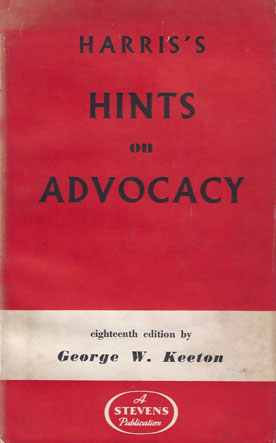
Out of Print
A 1957 3rd Impression of the original 1943 edition
... from the Preface
The first edition of this work appeared so long ago as 1879, and in the succeeding editions down to the seventeenth the text has remained . substantially as the author wrote it. The immense popularity of this handbook for advocates is no accident, for Richard Harris combined an exhaustive knowledge of the standard works on advocacy with very extensive appreciation of its practical application.
Lapse of time, however, has brought about a change, not only in those who to-day require instruction in advocacy, but also to some extent in the social conditions of those with whom the advocate comes in contact, whether as parties to an action, as defendants in criminal prosecutions, as witnesses or as jurors.
It has been the desire of the present editor to preserve substantially unaltered as much of the original text as was possible, having these changed conditions in mind, and it will therefore be found that apart from the two opening chapters which are new, and some rearrangement of the later chapters, the modifications in the text which he has attempted are as few as the practice of modern advocacy justifies, and he is by no means unaware of the presumption which is involved in any attempt, however well-intentioned, to adapt the style of a writer as individual as Richard Harris was. G.W. Keeton June 1943